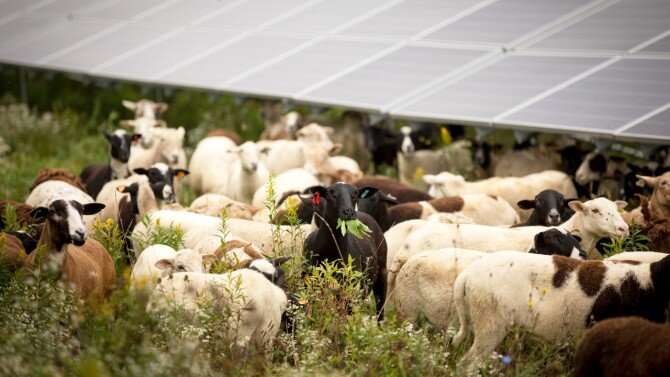
Electric sheep: Grazing in solar arrays supports economy, climate

As industrial-sized solar installations pop up throughout New York and New England states, residents fear the loss of agricultural land. One solution is simple: Sheep.
Cornell University associate professor Todd Schmit is partnering with farmers, solar companies and the American Solar Grazing Association, a nonprofit trade group that connects solar companies with shepherds, to explore the economic benefits of a business cooperative or producer-owned organization that could provide coordination and logistical services for farmers grazing under solar arrays.
“This idea complements the goals of reducing fossil fuel use in New York state and throughout the Northeast,” Schmit said. “There are literally thousands of acres going under new solar production, and I think increasing renewable energy production is a great thing, but it’s a little ironic if we’re promoting renewable energy production, and then because we need to control the vegetation, we’re going out there with mowers that are using fossil fuels or spraying it with pesticides that are killing the plants.”
Lexie Hain, a farmer in the Finger Lakes region and executive director of the American Solar Grazing Association, sees this as a boon for shepherds but part of the challenge is coordinating between a few large multinational solar companies and many small farmers.
Schmit believes this problem could be solved by helping farmers create a producer-owned business cooperative that could negotiate contracts and share transportation equipment. Beyond grazing, the project also will explore potential benefits of farmers collectively producing and marketing lamb, including sharing processing equipment and creating a value-added brand for marketing “sheep produced under solar arrays.”
More than half of the lamb and mutton consumed in the U.S. is imported from New Zealand and Australia, so providing more market opportunities for local shepherds would benefit the New York and New England economies, and reduce the carbon footprint of sheep products consumed here.
While Schmit’s three-year, $500,000 project—funded equally by Cornell and the U.S. Department of Agriculture—will focus on New York, Pennsylvania and the New England states, he hopes lessons learned from the project will be useful to sheep farmers throughout the United States.
“Coming to consensus among a potentially disparate group of farmers about their needs and goals for collective action is the first step to new cooperative development, and without it the enterprise cannot move forward,” Schmit said. “As an economist, I think there’s a real opportunity for expansion of the industry, and an opportunity to bring new farmers into production agriculture.”
Citation:
Electric sheep: Grazing in solar arrays supports economy, climate (2021, October 14)
retrieved 14 October 2021
from https://techxplore.com/news/2021-10-electric-sheep-grazing-solar-arrays.html
This document is subject to copyright. Apart from any fair dealing for the purpose of private study or research, no
part may be reproduced without the written permission. The content is provided for information purposes only.
Stay connected with us on social media platform for instant update click here to join our Twitter, & Facebook
We are now on Telegram. Click here to join our channel (@TechiUpdate) and stay updated with the latest Technology headlines.
For all the latest Technology News Click Here
For the latest news and updates, follow us on Google News.

